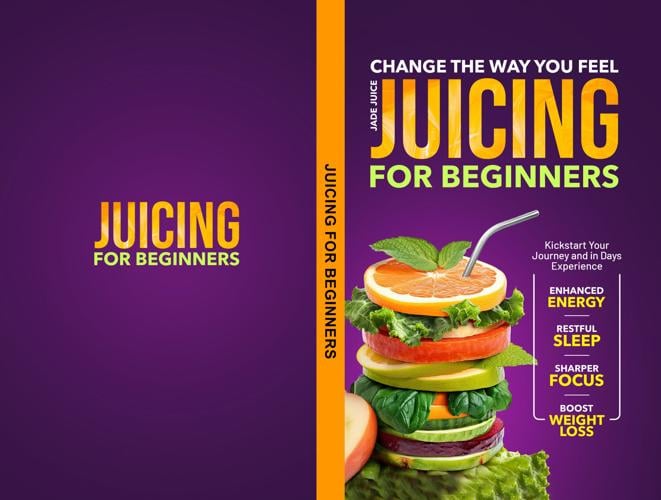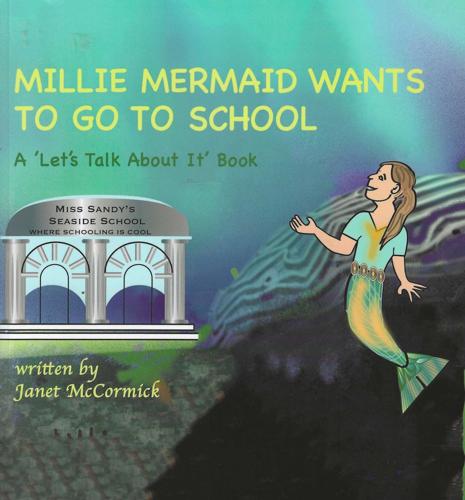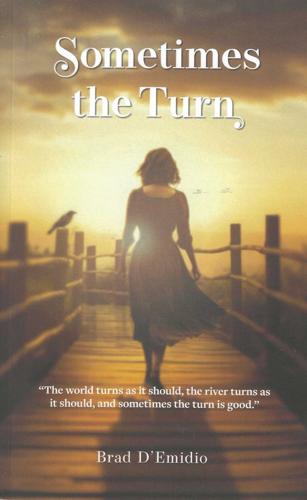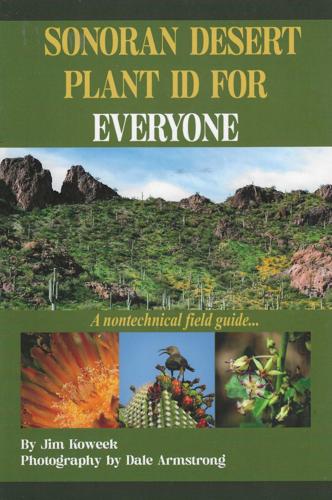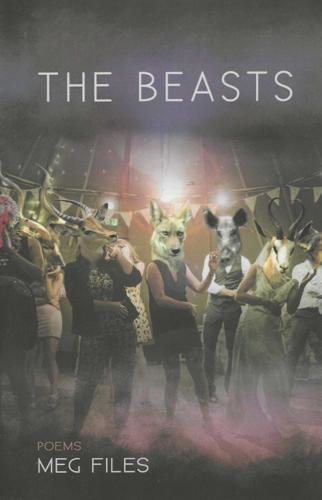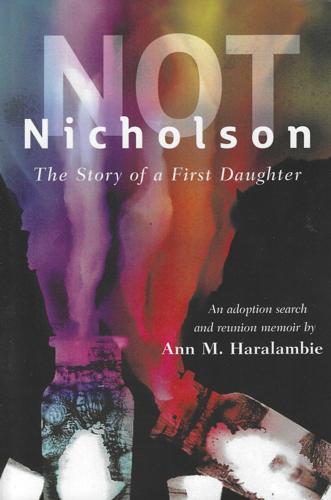“Juicing For Beginners: Change the Way You Feel” by Jade Juice. Independently published. 206 pages. $29.99; $15.99 paperback, $6.99 Kindle.
Juicing is good for what ails you, says the author of this informative how-to. Boosting the immune system, upping energy levels, calming inflammation, lowering blood pressure, shedding extra pounds — there are, it appears, endless benefits to downing a glass, or many glasses, of nature’s goodness.
Jade Juice is a buoyant, humorous writer. She’s also a true believer, based on her personal experiences with juicing, and she’s a cheerleader for adopting a healthy, juicy lifestyle. Juice is not a replacement for a well-balanced diet, she says, but it’s a dazzling addition. She speaks authoritatively and with nutritional expertise in this well-referenced volume about the juicing process: the best juicing equipment, the specific benefits of a variety of fruits and vegetables, kitchen tips, and even ideas for using the leftover pulp (dog biscuits, anyone?). With freshly-made juice in hand, she segues into detox action plans, which involve setting health goals and embarking on a curated detox program (several juice cleanses, in varying lengths, are explained in detail).
The juicing curious will be delighted with the extensive recipe collection, tailored to specific conditions like sinus infections and diabetes. The author, who lives in Southern Arizona, writes with enthusiasm and a can-do spirit that will beguile even the juice-skeptical.
— Helene Woodhams

“Millie Mermaid Wants to Go to School: A ‘Let’s Talk About It’ Book” by Janet McCormick; Illustrations by Steven Gordon Linebaugh. Authorhouse. 24 pages. $12.99; Kindle $3.99.
Janet McCormick wants kids to talk about what’s on their minds. With this interactive picture book, each page offers prompts for starting conversations about thoughts, feelings and ideas that enhance the read-aloud experience.
Millie Mermaid is too little to keep up with her older sister and her friends, and she’s tired of getting aced out of all the fun. Going to school would solve this problem, she thinks, and she waits impatiently for that day — but when it finally arrives, she has misgivings.
With an extensive background in preschool education, McCormick ably zeroes in on little-kid frustrations and anxieties, demonstrating how the future can be simultaneously exciting and scary. The goal of the “Let’s Talk About It” books is to start a dialog that encourages young audiences to think critically and consider their own experiences in a reassuring atmosphere. Charming undersea illustrations by Steven Gordon Linebaugh add to the fun. McCormick, a former preschool director and curriculum developer, lives in Tucson.
— Helene Woodhams

“Sometimes the Turn” by Brad D’Emidio. Independently published. 219 pages. $10.99; Kindle $3.99.
Those who take out their frustrations on the weak feel powerful in ways they cannot achieve otherwise, observes author Brad D’Emidio. The ill-treatment of those least equipped to defend themselves informs his thoughtful new novel, which explores how strength and determination can come from unexpected places, and how resiliency can be a super power in the face of inhumanity.
Unloved and abandoned by her mother, Evelyn spent her harrowing early years in and out of foster homes where she was abused and neglected. Friendless and lacking self-esteem, she learned early on to expect nothing from other people but cruelty and brutality. In the depths of hopelessness she is befriended by Marty, a co-worker who takes her in and cares for her, asking for nothing in return. For Evelyn, Marty’s kindness is revelatory: she is not unlovable, and fulfilling human connections are within her grasp. A way forward becomes clear, although it’s not an easy path and roadblocks abound. Being open to love is a choice, says D’Emidio; the decision is Evelyn’s to make. The author, who moved to Southern Arizona after a business career in the Pacific Northwest, now lives in Marana, and is a member of the Oro Valley Writers Forum.
— Helene Woodhams

“Sonoran Desert Plant ID For Everyone: A Nontechnical Field Guide.” by Jim Koweek. Photographs by Dale Armstrong. Rafter Lazy K Publishing. 314 pages. $28; Kindle $9.99.
“Learning about plants should be fun,” says Jim Koweek, who clearly had lots of fun writing about them. He admits that this field guide wasn’t a project he initially wanted to tackle — Koweek feared he might have gotten soft, having blissed out in an arid grasslands canyon in southeastern Arizona for the past 30 years, rather than in the “hot, thorny and snaky Sonoran Desert.” But he found himself beguiled by the complex, sometimes other-worldly nature of Sonoran Desert nature. He shares his unabashed enchantment in this lavishly-illustrated, user-friendly volume.
After three years of desert trekking and 200,000 photos, Koweek and photographer Dale Armstrong settled on 300 plants (researchers believe the Sonoran Desert has the greatest diversity of flora and fauna of all the North American deserts). They are divided into color-coded sections (trees and shrubs, cacti and succulents, forbs, grasses, and ferns and mosses) and each entry features Armstrong’s spectacular photography along with descriptions, interesting factoids, suggestions for landscaping, and the occasional warning (nothing good comes from touching the milky sap of the Euphorbias, for instance, and the consumption of a Datura is guaranteed to ruin your day).
In addition to identifying plants, Koweek also considers the two major threats to them — development and invasive species — and his observations offer serious food for thought.
It’s useful information alright, but the joy of this guide is in its humorous and folksy presentation — it’s like having a lively and knowledgeable companion along on your desert stroll. Koweek and Armstrong previously collaborated on the local classic “Grassland Plant ID for Everyone—Except Folks That Take Boring Technical Stuff Too Seriously.”
— Helene Woodhams

“The Beasts” by Meg Files. Finishing Line Press. 27 pages. $15.99.
Recall the pandemic? The deep pandemic times? The eerie quiet. Shuttered shops. Empty streets?
And the animals. Do you recall jackals in Tel Aviv. Monkeys in India palaces. Lions asleep on roads?
Meg Files clearly does. And she’s drawn from them a weirdly wondrous meditation on life, death, love, the animal world, and human stewardship of this “peeled planet.”
In 25 prose poems, Tucson novelist, poet and educator Files presents a tale of four humans — two dead, one dying and the fourth witnessing — plus a chorus of costumed animals. It lifts the veils between life and death and between human and other animals, and chronicles the disappearance of Homo sapiens.
A woman is the central character. She’s alive. The veterinarian is her father, he’s dead. The friend is her friend. A poet, also dead, but identifying new writers. Her husband is in the hospital with ground-glass opaque lungs. “Poor outcome” is expected.
It’s pandemic times. Animals reign. Javelinas roam the empty malls and deer forage in the streets. “The creatures, clothed and unclothed, are in the ruins,” says the narrator, “— yes and the tango skeletons naked beneath gossamer — here they are in the world with us sequestered. They will inhabit our stadiums, the band shells, a cabana…. We in sweatpants have forgotten that we are animals.”
“See,” the dead try to tell their living companion, “it’s all over.” See, Files tells us in sweatpants, it’s our fault.
The veterinarian now wishes all animals could be released from the oppression of humans. The friend rues humans filling their trunks with plastic bags and letting the bufflegrass roam. And the woman, weeps for her beloved as the animals cavort.
But all is not lost:
The woman becomes a coyote, and she admires her buff underparts. She becomes a bobcat and resents being called Stubby. She becomes a fox, and leads her kits freely through the streets of the town.
It’s indeed a weirdly wondrous … wryly wonderful … allegory.
— Christine Wald-Hopkins

“Light as Light” by Simon J. Ortiz. University of Arizona Press. 151 pages. $26.95.
There’s a wholeness — a sense of unity — that flows through the varied aspects of the nearly 150 poems in this new collection by celebrated Native poet Simon J. Ortiz: talk of language flows into a dance; Acoma legend into prayer, running into song; and always the power of words — in English and Keres — words, as he says, as experiences … thoughts and ideas as action. Plus love. Ortiz dedicates the collection to his “beloved Jami” (Proctor Xu), and he writes that many of the poems actually come from the emails and texts they’ve shared.
Ortiz’s first publication in 20 years, it includes memories and family, life and joy in poetry and sobriety and place. As he writes in “Song” a poem about a morning run in the rain: “Strangely though more than usual I feel happy healthy and wholesome words/thoughts feelings of gratitude and love coming to me unbidden as offerings.” It’s a gift.
— Christine Wald-Hopkins

“Not Nicholson: The Story of a First Daughter” by Ann M. Haralambie. Wheatmark. 354 pages. $17.95.
“Dogged” doesn’t begin to describe Tucson attorney Ann Haralambie in her search for her birth parents. “Indefatigable ” might do. Even “compulsive.” But if you’d want an advocate to track down your own family, you’d want a Haralambie on your team.
Called “an adoption search and reunion memoir,” “Not Nicholson” chronicles her decades-long quest. Born Nov. 15, 1951, in New York, called Female Nicholson on her birth certificate, she was adopted by New Yorkers Cecilia and James Haralambie. They were loving, attentive parents, and young Ann had a privileged childhood. She always knew she was adopted; she always knew she was “chosen,” but that always colored her perception of herself. By age 23, she was determined to find her birth parents.
Her hunt hit a frustrating maze of impediments, misdirections, thwarted threads, and false assumptions . Most impenetrable was the New York state closed adoption policy. The agency that facilitated the adoption stymied Haralambie’s efforts, but it did provide sketchy details. Most damaging — and it persisted for years, ensnaring an innocent family Haralambie was convinced was hers — was the false name her mother provided. Hence the the memoir’s title.
As you’d expect, not all quests are propitious.
In fact (as her family would admit), Female Nicholson grew to be a highly successful adult: a musical mother and grandmother, a Phi Beta Kappa with a Master’s and a J.D., attorney for child protection and advocacy, author and conference speaker. She tells a compelling story, writes affectingly about the child’s role in the “adoption triad” (child, birth parents, adoptive parents), and presents a powerful argument for transparency in adoption.
— Christine Wald-Hopkins


